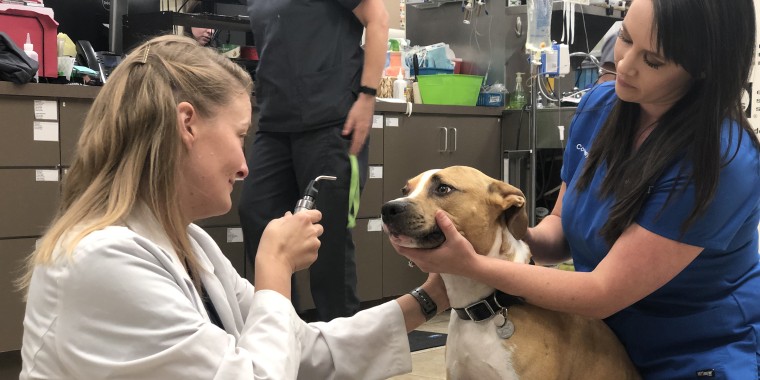A veterinarian’s close bond with her horse saved her life.
A decade ago, Dr. Kimberly Pope-Robinson was feeling powerless and trapped. She’d spent a great deal of time and money to earn her degree and become a successful veterinarian, but she was exhausted and stressed, and as a perfectionist, overly critical of herself.
“Suicide is a moment of intention, and I was in that moment of intention,” she told TODAY.
Luckily, she thought of her rescued horse, Toby, and that he wouldn’t see her again. It gave her pause.
Then her beloved cat, Sanjay, walked into the room. They also shared a loving relationship. She decided not to take the pills in her hand.
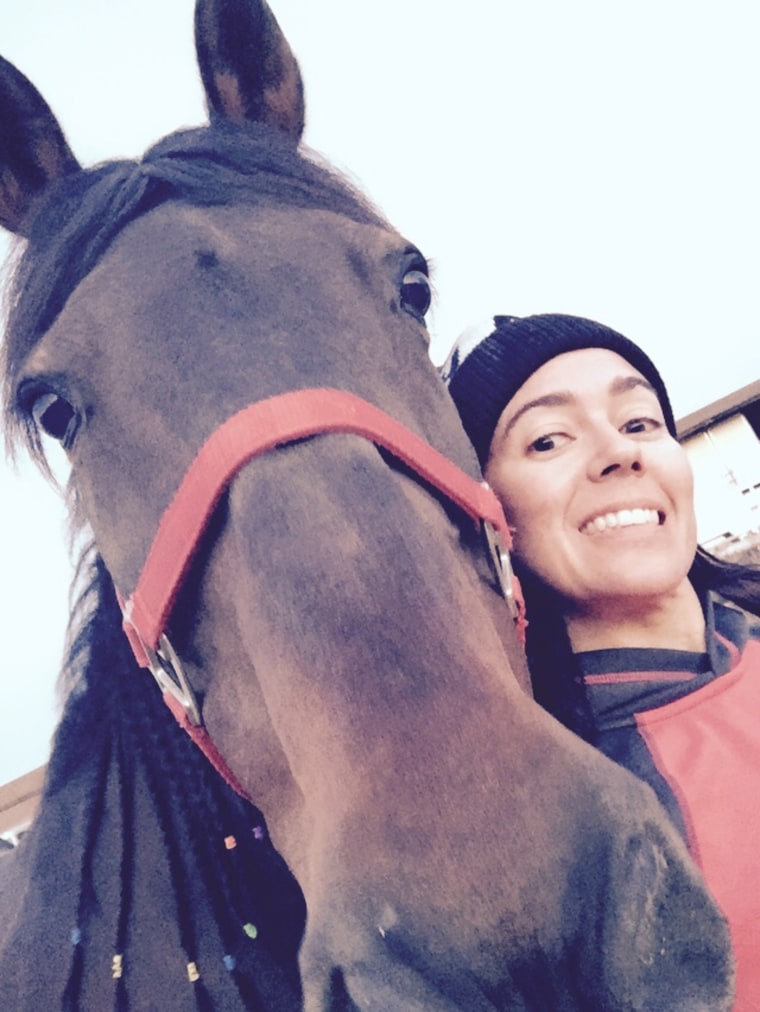
“Those two moments, I think, made me realize that this place of despair, this place at the bottom of this ocean of shame I was living in, it was painful, but it was a fleeting moment. I still remember it clear as day,” she said. “It allowed me to take a step back and start doing something different.”
Pope-Robinson went on to write the book “The Unspoken Life: Recognize Your Passion, Embrace Imperfection and Stay Connected” — which she dedicated to her horse — to share her experience and offer hope and coping techniques to others. She lectures frequently about wellness and suicide prevention at animal hospitals, veterinary colleges and conferences, and offers resources through her company, 1 Life Connected.
“When we hear each other’s stories, it opens us up to new ideas, unique solutions and realizing we’re not broken because we realize other people are struggling as well,” she said.
Suicide is a serious mental health issue that disproportionately affects veterinary professionals. A study by the U.S. Centers for Disease Control and Prevention found that veterinarians run a higher risk of dying by suicide than the general population: 2.1 times higher for male veterinarians and 3.5 times higher for females. There are more than 73,000 veterinarians in private practice in the United States, and around 60% are women.
Fortunately, many veterinary professionals are working to address the issue in the community. The nonprofit Not One More Vet started as a private Facebook group in 2014 after prominent veterinarian and author Dr. Sophia Yin died by suicide. It provides a supportive space for veterinarians to privately discuss the challenges of the profession, such as long hours, high student debt and stress. In five years, it’s grown to more than 20,000 members.
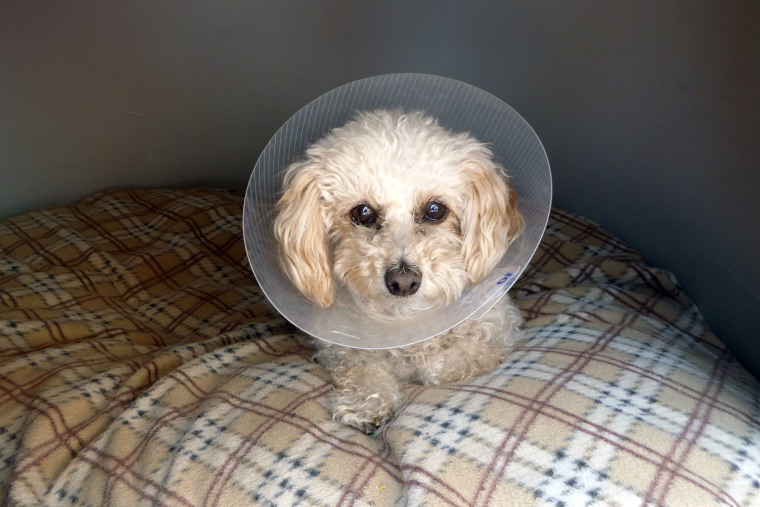
Dr. Carrie Jurney, a veterinary neurologist and vice president of Not One More Vet, said there are many different reasons why suicide affects the profession, including the amount of “emotional work.” For instance, veterinarians often provide euthanasia for beloved pets and empathize with grieving owners, and in their next appointment, greet clients excited about a new puppy.
“You can imagine that there is a lot of emotional whiplash there, right? You’re going from sad to happy to sad to happy all day long, which can take a toll on you,” she told TODAY. “If you’re not taking care of yourself, that can lead to burnout.”
Jurney said another challenge veterinarians face on a regular basis is “moral fatigue.” Advances in veterinary medicine offer better treatment options for pets, but people can’t always afford medications or surgeries for the animal, and veterinarians can’t afford to work for free.
“That moment is so hard for both the veterinarian and the pet owner,” she said. “Nobody is happy about that situation. So it creates this stressful, defeating feeling that you deal with every single day.”
Sometimes pet owners will start an online fundraising campaign to pay for veterinary care, and comments will attack veterinarians and their staff members as “greedy” or not caring about animals. Others will create viral social media campaigns attacking veterinarians.
“One of my friends wrote recently about receiving a death threat based off of a viral Facebook campaign. So these things really take an immense toll on veterinarians,” she said.
"We can’t pour from an empty cup. Please try to find something that brings you joy outside of work and your family obligations so you don’t get lost.”
Jurney encourages people to be kind to one another and to reach out for help when it's needed. Not One More Vet offers resources for veterinarians, including grants for mental health services and a confidential peer support program, in partnership with the Veterinary Social Work program at the University of Tennessee, that offers help finding resources. The organization is launching a Facebook group for veterinary support staff as well.
“I want anyone in a dark place to hear that there is a light at the end of the tunnel,” she said. “I know from personal experience that when you are at the bottom of the pit, it feels like there is no way out. And I want you to hear that there is. There is help out there, but you need to reach for it. So keep swimming, keep fighting and reach out.”
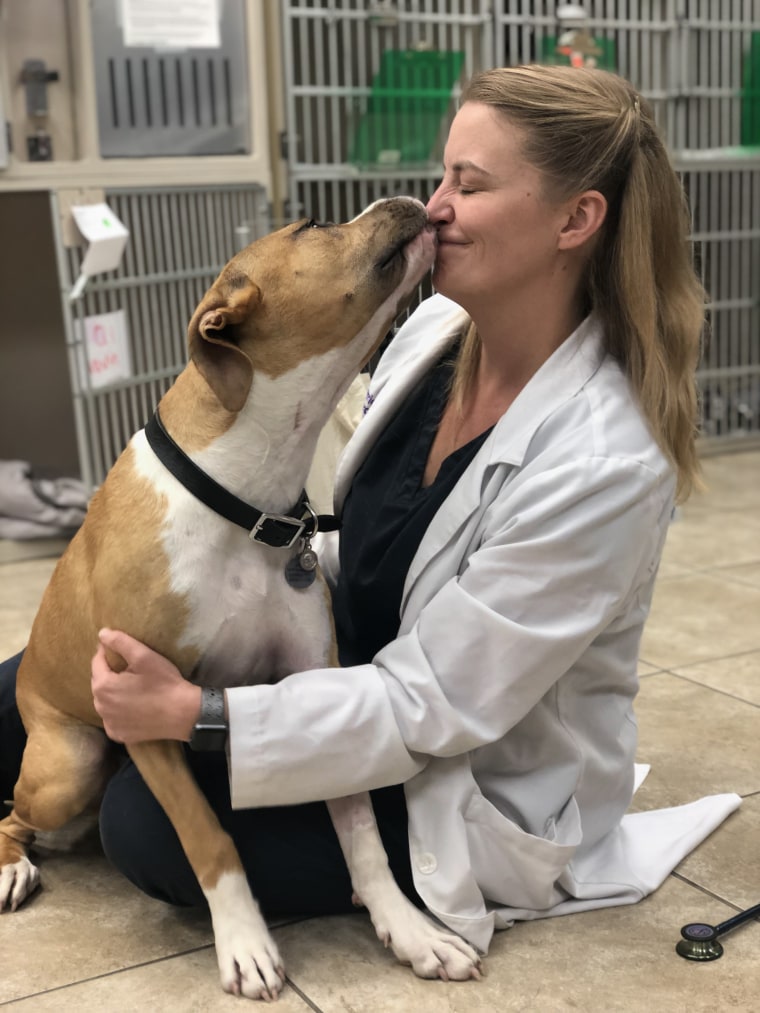
Dr. Jen Brandt, a social worker and director of well-being and diversity initiatives for the American Veterinary Medical Association, said it’s important to note that while suicide is a serious issue in the U.S. and globally, it’s also true that many veterinarians are thriving.
Suicide is not an inevitability.
So AVMA has programs to help veterinary professionals in crisis — such as a cyberbullying hotline, crisis intervention services at colleges and free suicide prevention training for members — as well as tools to help prevent a crisis in the first place.
For instance, the nonprofit hosts a veterinary well-being summit, offers free online wellness and financial planning resources, and maintains a list of peer-assistance programs around the country. AVMA is also networking internationally with the United Kingdom’s Royal College of Veterinary Surgeons and World Small Animal Veterinary Association to share research and solutions.
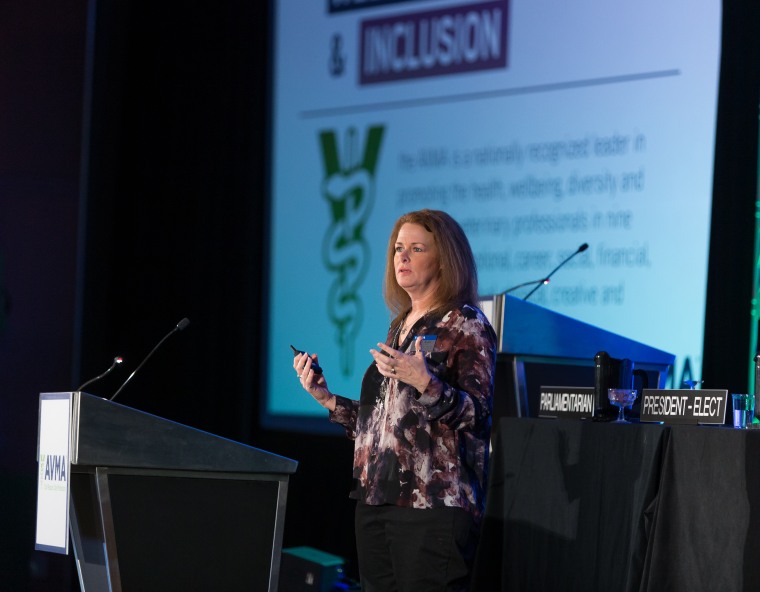
“We know that hope saves lives,” Brandt told TODAY. “We know that every life matters and we want people to know that a good life is possible. So our efforts are really aimed at making those healthy choices — whatever that might be for an individual or an organization — the easy choice so that people in the profession and beyond have the opportunity to thrive personally and professionally.”
Dr. Michael Cavanaugh, a veterinarian and chief executive officer of the American Animal Hospital Association, said veterinary medicine is a “wonderful, passion-driven profession.” AAHA implemented a comprehensive Healthy Workplace Culture Initiative so that veterinary professionals can be happier at work.
“If we can work in a healthy, supportive environment, a struggling person will at least be buoyed up rather than driven down,” he told TODAY in an email. “In a perfect world, work would be a respite from our colleagues’ crazy and complicated lives.”
Dr. Heather Loenser, a veterinarian and AAHA’s senior veterinary officer, said she’s immensely proud that AAHA is investing in resources that can help veterinary professionals deal with the issue in the workplace and at home because she’s lost so many colleagues to suicide.
She said leadership in the profession in now paying close attention to the health of veterinary students, but previous generations were often selected because they worked extremely hard and typically put their own needs “on the back burner.” She suggests veterinarians acknowledge that it can feel unnatural to say “no” or to put their needs first.
“I would also like to give a shout out to veterinary mothers who are balancing so much between their careers and families,” she told TODAY in an email. “It is so hard to carve out time for ourselves … but we can’t pour from an empty cup. Please try to find something that brings you joy outside of work and your family obligations so you don’t get lost.”
Loenser said the public can support veterinarians by not attacking them online when upset. Instead, she recommends calling the practice manager to discuss the issue.
On the other hand, she said small messages of gratitude “mean the world to veterinary teams.”
“We often receive thank you cards after we euthanize a pet, which is very thoughtful,” she said. “We’d also love to be thanked when we go above and beyond to treat a pet, too. And don’t forget the rest of the team — veterinarians can’t do what they do without passionate team members who care for pets and their people.”
If you or someone you know is in crisis, call the National Suicide Prevention Lifeline at 800-273-8255, text HOME to 741741 or visit SpeakingOfSuicide.com/resources for additional resources.
